Gabriel Serrano was a teenager when he first discovered the magic of opera nearly 22 years ago. After two decades as an opera fan, he wanted to share the wonder of the art form with his first, second, and third grade students at Emelita Elementary. Through our Opera for Educators program, Gabriel is able to incorporate some kid-friendly opera into his lesson plans and kickstart what he hopes will be a lifelong love of the art.
Can you give us a little intro?
I'm Gabriel Serrano. I teach first, second and third graders in the special day program at Emelita Elementary over in Encino. I've been teaching for about nine years in total, but I’m going into my seventh year of teaching elementary students.

Teachers participating in a session of Opera for Educators.
When did you get involved in Opera for Educators?
I was in the middle of getting my special ed teaching credential and came across [an ad for the program] in our UTLA News magazine. I’ve always been an opera fan, so as soon as I saw it, I jumped on it. I think this is my fifth year or so being in the program.
How serendipitous. You said you’ve always been an opera fan. When did you get into it?
I was a teenager. My best friend and I would take the train into downtown from Sylmar. The idea was that we would go to the Central Library, which we would, but then we'd go have adventures in downtown LA as normal teenagers do. One time we ended up at the Music Center and we ran into a teacher we knew from academic decathlon. He was going to a dress rehearsal and offered to get us in through one of the programs you guys had—and he did. So I saw your 1998 production of Carmen and I’ve been hooked on opera ever since.
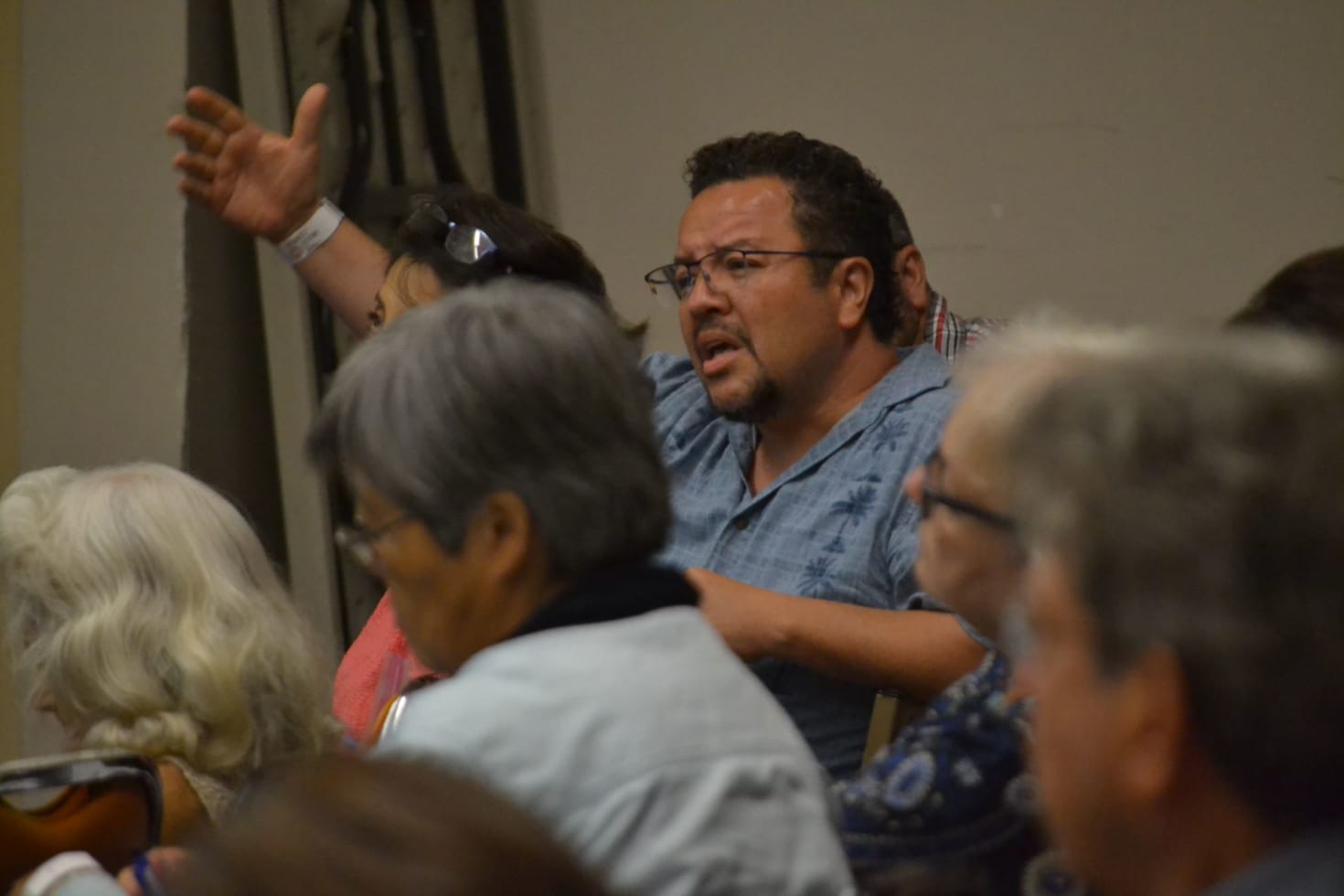
A teacher participating in a session of our Opera for Educators program.
So you’ve really been on both sides of our education programs. What do you think is so great about this one?
Well, a big part of what we have to do as teachers is find ways to integrate a ton of different subjects. And opera is great for that. I can talk about music and history through opera, or in other ways, I can build lessons around math and sciences.
What are some of the ways you’ve incorporated opera into your classroom?
I’ll usually play some kind of opera in class when the kids are eating breakfast to start off the day, whether I show a few scenes or just play some songs. One of [the students’] favorites is the "Toreador Song" from Carmen. After a while, they’ll start asking me questions about the stuff I show them. But one of the major ways I’ve used opera in my classroom is through history. A big part of the second-grade curriculum is “Then and Now.” We talk about how things were back then and how they are now. So I play an opera for them and they’ll ask me “Why did people have to sing in that voice?” And from there I can say, “Well, let’s look at the technology of the time. Back then, they didn’t have microphones or speakers, so they had to use a loud voice.” It’s really been a great way to get the kids engaged in subjects they might not gravitate towards, and then also get them into [an art form] they might not have otherwise been exposed to. Now all of my kids want to take a field trip to the opera.
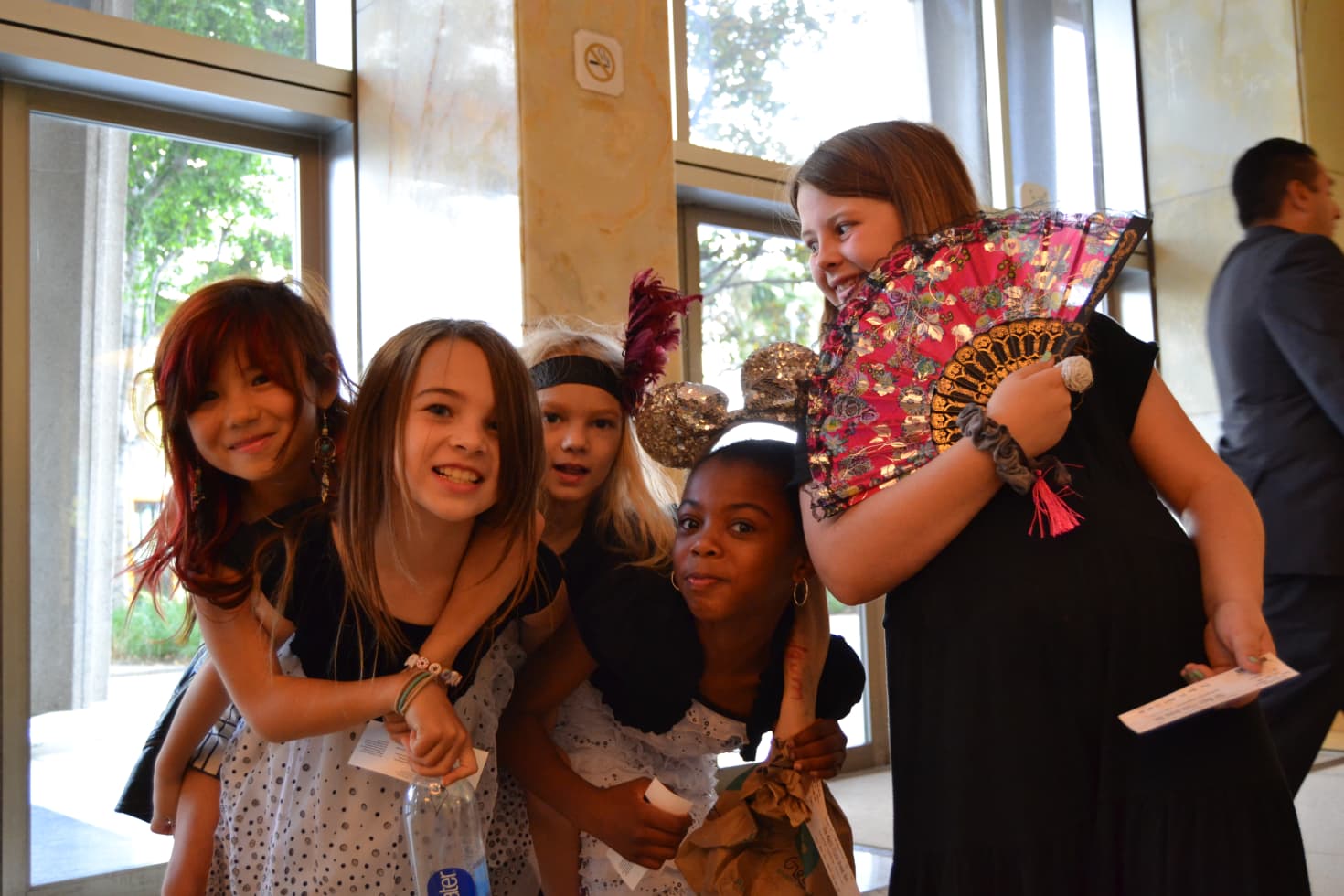
Students on a trip to the opera.
A field trip to the opera sounds like a great way to spend a school day.
It really is. The kids love it so much. We took a field trip to see a matinee of Puccini Opera Tales and for the rest of the day they all wanted to sing in their “opera voice,” so you can imagine what that bus ride back was like. Another great trip we had was when we saw The Prospector. They talk about Minnie the Barmaid and the little coyotes. That performance actually made them want to put on their own little opera skits. I gave them little coyote ears, so they’ll put those on and pretend to be coyotes and act out those scenes. We have a program called Readers Theater, where students are supposed to put on their own plays. We put on operas and use the stories as little librettos. And it’s great because students of all different reading levels can contribute in their own way.

Students participating in our Open Door Days.
That sounds adorable. It’s great that you can get all of your students involved.
It really is. As a special ed teacher, I work with students who have a wide variety of abilities. There are some students that are super capable in some ways, and some students that are super capable in other ways. So just seeing them find parts of the lessons and activities that they can engage with and feel like they can contribute to is a big deal. I remember we were doing a lesson on the artist Mondrian, and we were using set design as a way to talk about it and prepare for another one of our skits. I had this one student create this whole backdrop of Mondrian shapes and figures. And it was definitely a wow moment for me because he wasn’t the best reader or speaker, but he was able to contribute in his own way and still engage with and benefit from the material.
Have you had any other wow moments?
Actually, that student [who made the backdrop] is one of three siblings who goes to my school. I work with him and his brother, but not their younger sister. The two boys had gone on the field trip to the opera house with me, but she was a little too young at the time so she didn’t get to go at first. Well, her brothers kept talking to her about the opera and telling her how much fun it was, so then obviously she wanted to go too. When she’d stop by my classroom to say hi to her brothers, she’d always ask me when it’ll be her turn to go to the opera. And she was persistent and kept asking me to go, so eventually we made it happen this past year. She even had her mom get her this really nice dress and made it a whole big deal. She had a great time seeing the chandeliers her brothers kept talking about and just really enjoyed her time there. Seeing that kind of childhood wonder is amazing. So I hope she holds on to that excitement and love of opera into adulthood.

Students on a trip to the opera.
We talked a lot about what your students get out of the program, but what have you gotten out of it?
One thing about being a teacher is that we're all lifelong learners, and I think this program is an example of that. It’s so much more than just learning about opera too. We learn the history of the art and a lot of musical theory from some great lectures, which I find very interesting. But for me, it’s really about what you could bring back to your kids. And that is, you know, new insights and strategies for arts integration, and just the excitement of discovering something new. A colleague of mine took this program too, and her kids loved it as much as mine. She ended up making a whole center in her classroom where her kids could go and grab different librettos and sing to each other throughout the day. It just shows how you don’t have to have a super traditional classroom set up to get your kids active and engaged.
Do you have any last words you want to leave us with?
I'm just really glad that this program exists. Not only can we learn more about ourselves and take [what we learn] back to our classroom, we can bring the kids to the opera house. And I know it might not sound like much to some people, but it’s such a great experience these kids wouldn't otherwise have. And it really, in a lot of ways, feels like a full circle moment for me. I mean, I've benefited from these opera education programs when I was younger. They’re the whole reason I got into opera in the first place. So I hope by participating in this program, I’m able to do the same for some of my kids and show them that there's so much more they can experience in life if they just go looking for it.
Generous support for this program is provided by Susan Zolla, in memory of Edward M. Zolla. If you want to learn more about our Opera for Educators, click here.

